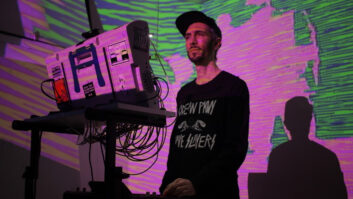INDIAN WELLS, CALIF. -IRMA members faced the music.the Web variety of course, along with hard disc recording, DataPlay and digital TV during its 31st Annual Recording Media Forum, here at the Hyatt Grand Champions.
With its conference theme of “The Evolution of Technology: Change Is Constant,” the International Recording Media Association, the trade group serving mostly recording media replicators and duplicators, discussed the new technologies that are changing and challenging the music and movie industries.
Charles Van Horn, president of IRMA, was upbeat about his industry’s future, citing Consumer Electronics Association (CEA) projections about surging demand for DVD players, CDs, digital TVs and MP3 players this year and in the near future. “While your customers will have access to your content.[and] your advantage is up for grabs,” he told his membership that media replicators and duplicators “are not alone in this, and it is not at a disadvantage.” He cited a surge in DVD Video replication (see charts on p. 37) as just one reason for his bullishness.
Van Horn saw some hopeful trends in the marketplace and in the discussion over digital downloads from the Web. In magnetic media, he said, “There is a slow decline in duplication, but we will be well into the second half of the decade before we see a major decline.” Van Horn also quoted CEA president Gary Shapiro, who made a statement against piracy, but backed fair use for consumer recording, during CEA’s Digital Download meeting in Washington D.C. (TWICE, March 12, p. 1).
In his keynote address, Scott Sheiner, sales and marketing executive VP of online music service MP3.com, said the “biggest problem in digital media now is that there are no set rules.no definitive rules.”
“Unless copyright laws are set,” he added, “Sony, Philips and other consumer electronics giants are not going to introduce or develop new technology.because they don’t want to be sued.”
Sheiner noted that users of his service have shown certain behaviors during the past couple of years, and “sixty percent of our consumers stream music” from MP3.com to sample material they normally would not have bought. “The CD is the key to the program” at MP3.com, he said, because the company provides “server-side security. Downloads in our system get paid a royalty fee.”
In the future, downloads will come directly to a car from the OnStar service, or be sent to PDAs and cellphones, as well as MP3 players, “so the [prerecorded] CD will eventually go away,” Sheiner said.
However, he feels that time is well down the road: “Are CDs obsolete? In the U.S. most of us like collectibles. That’s why there’s eBay. So, no, they will not disappear soon.” And on a technological level, Sheiner noted, “It takes a lot longer to get to the ‘great wired world’ than one expects. Broadband will take some time to roll out” and be popularly priced.
Recording artists were also heard from at IRMA, represented by Thomas Dolby Robertson, who is also founder of beatnik.com. “Music is the killer app for the Web,” he stated, and the Internet is “the best marketing tool [recording artists] have ever had.”
Robertson admitted that he felt “robbed by Napster” as a result of all the free downloads of his music. “This is the year the music business should create a legitimate digital music service for the Web,” he added.
In his speech about digital TV, Dale Mowry, transmission products VP of Harris Broadcast Communications, discussed the concerns of Hollywood. “The Internet music controversy has set off alarm bells,” he said, making the studios fear that “consumers will soon be downloading digital-quality copies of its movies, a la Napster.”
While Mowry feels their pain, he did say that “a distinction should be drawn between digital materials viewed via premium services such as cable and DBS on one hand, and those received free, via over-the-air broadcasting on the other” citing the 1984 Supreme Court ruling allowing over-the-air home recording. He added, “Any degradation of the digital signal would remove one of the principle reasons for buying an HDTV in the first place.”
Media Production 2000-2002
All numbers are units in North America, which include the U.S., Canada and Mexico.
Source: Cambridge & Associates cTWICE 2001













